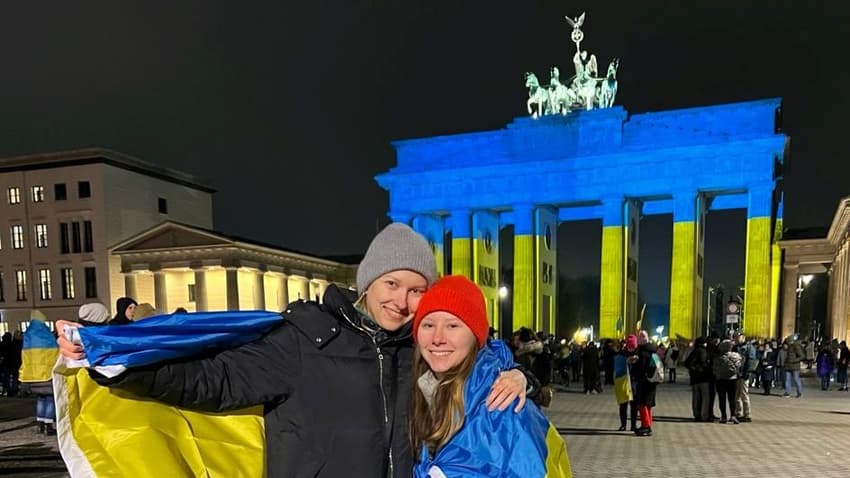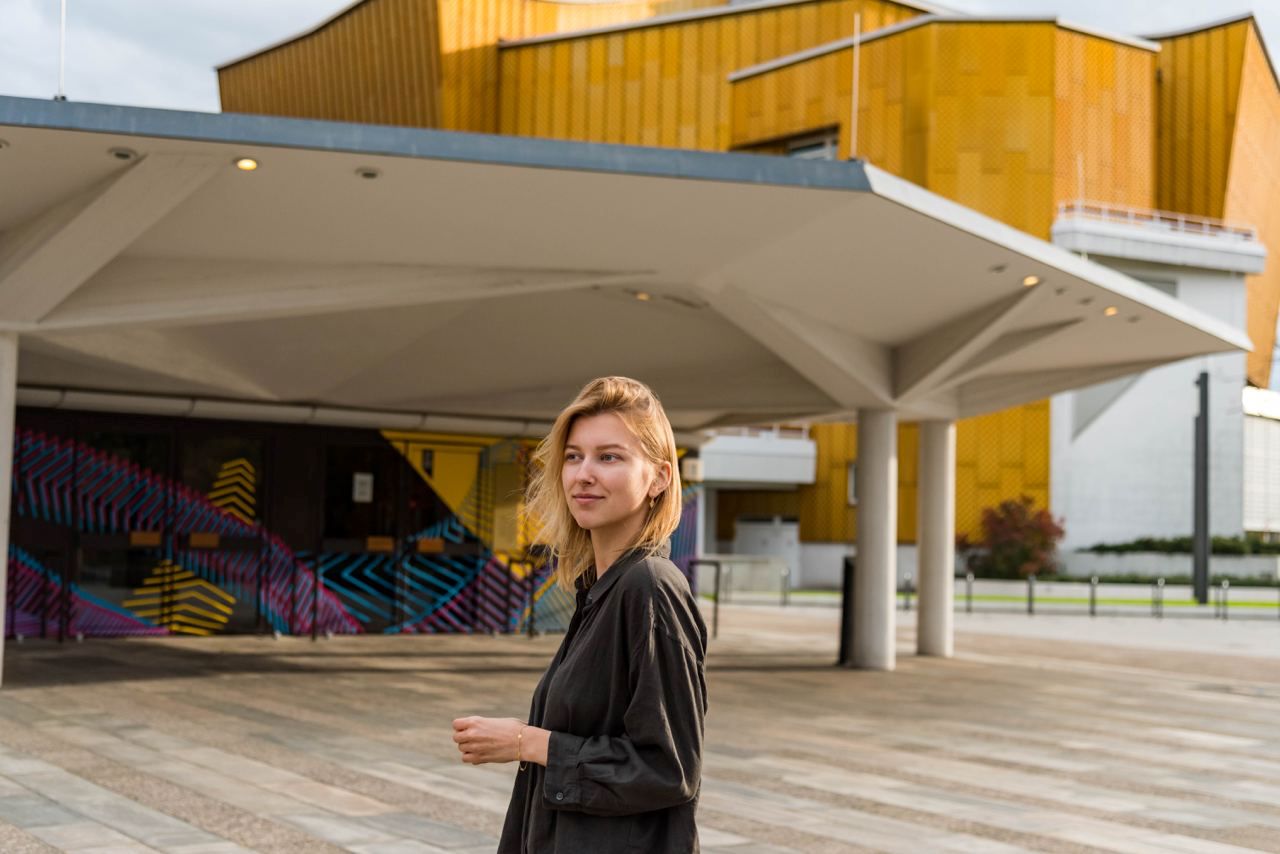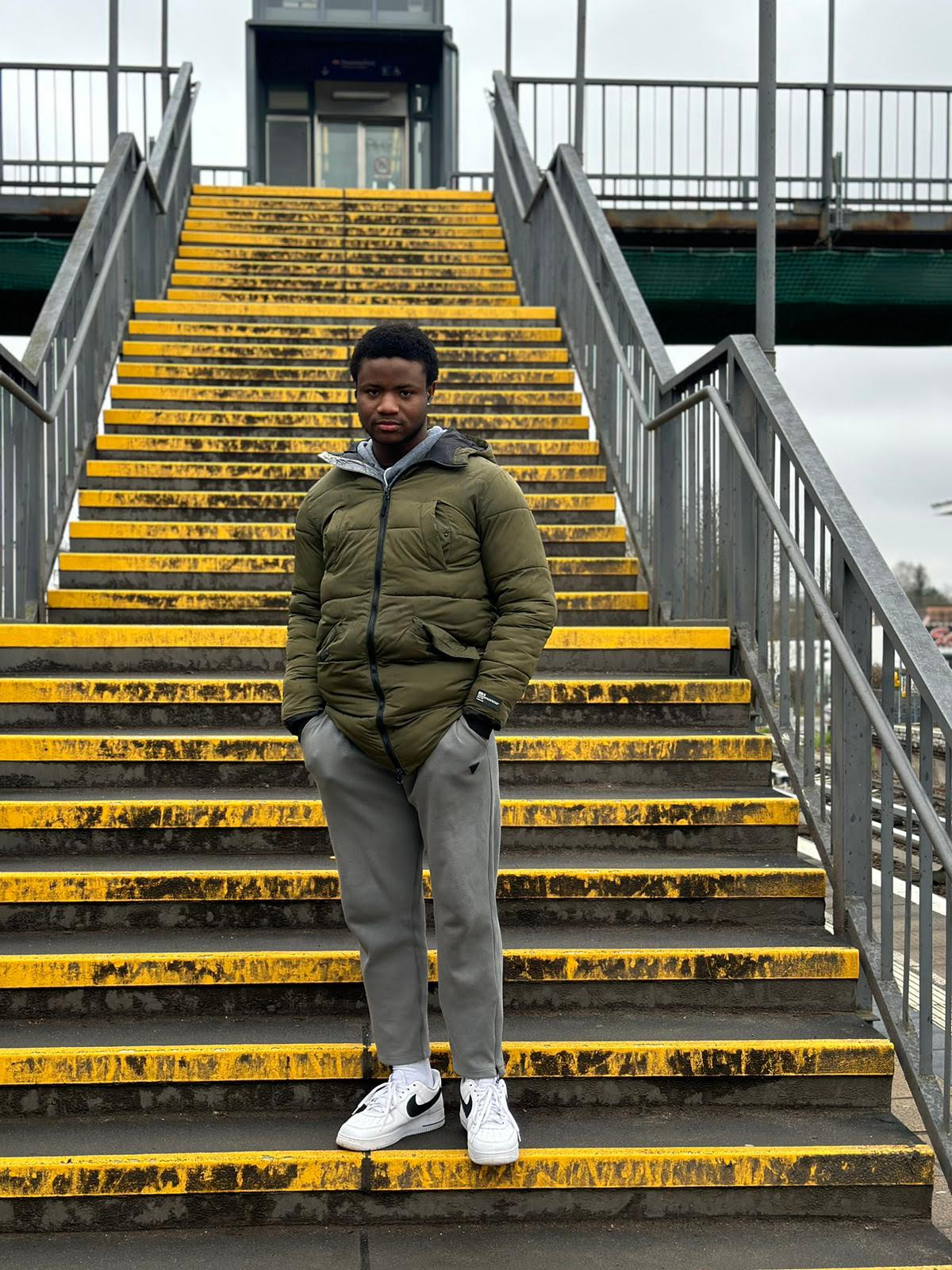Two years later, two Berlin residents from Ukraine on how war affects their lives

When Russia invaded Ukraine two years ago, a wave of refugees fleeing from the conflict landed in Germany. The Local speaks with people who were directly affected - how their lives have been changed by the war, and how they're moving forward.
On Sunday Ukrainian President Volodymyr Zelenskyy warned that Russia is preparing a new offensive that could begin in early summer.
Speaking with American broadcaster NBC News, Zelenskyy said, “Now is the hardest moment for our unity.” He added that a split between Ukraine and its external partners would be devastating.
While Germany has backed Ukraine since the start of the war – providing military support in the form of weapons and funding – some have criticised Chancellor Olaf Schulz’s coalition government for not doing enough to help ensure a Ukrainian victory.
READ ALSO: OPINION – Germany's timid strategy risks both Ukraine’s defeat and more war in Europe
But for most German residents, among the war’s bigger primary impacts is the sheer number of refugees who have sought shelter from the conflict within the country’s borders. In 2022, Germany’s Statistical Office (Destatis) recorded 1.1 million arrivals from Ukraine.
Many Ukrainian citizens and residents who fled conflict zones have since returned to their home country, but some remain in Germany.
To better understand how the war has affected lives on the ground in Germany, The Local spoke with Olena Barashyvets and Gabriel Onuigbo, two Berlin residents who were deeply affected by Russia’s invasion in different ways.
'It's been two years of horrors'
Olena Barashyvets had already lived in Berlin for several years when war broke out in her home country of Ukraine. In February 2022, she watched the news and called her family in Ukraine constantly as the inevitability of Russia’s invasion became more and more clear.
“The war affected everyone a lot and our lives will never be the same,” Barashyvets told The Local. “It’s been two years of horrors and danger for my friends and family in Ukraine, and we still need to convince the West that it's their war too.”

Olena Barashyvets came to Berlin in 2017 to study. But she says Russia's annexation of Crimea and invasion of Donbas made her anxious about Ukraine's security of the country as early as 2014. Photo provided by Barashyvets.
Barashyvets’s parents live in Bucha, a region where hundreds of civilians and prisoners of war were brutally killed in an event that has since been named the Bucha massacre. Her parents fled their home on February 25th, 2022, just a couple days before Russian forces first entered the city.
“If they waited longer, they could’ve gotten trapped their or worse…” Barashyvets said. She added that Russian soldiers occupied her family home during March 2022. They looted the house and damaged her family’s property before Bucha was liberated by Ukrainian forces on March 31st.
During that time, her mother stayed with her in Berlin while her father stayed with friends in western Ukraine. Her great aunt and uncle also took refuge in Germany for a couple of months.
Her grandparents, however, remained in Kyiv. “We got the impression they would rather die than leave their home,” Barashyvets said.
Still, in comparison with other Ukrainian families, Olena counts hers lucky – noting that she’s grateful none of her close friends or family members were killed.
“Even after two years our spirits are strong and every Ukrainian is doing what they can to support our army,” she told The Local.
“For me it’s donations, for some of my friends it's enlisting in the military, for my grandma it’s prayers.”
'Coming to Germany, I was treated well'
While the vast majority of refugees fleeing Russia’s invasion were Ukrainian citizens, there were also foreign nationals from other countries who found themselves suddenly needing to get out of harm's way.
Among them was Gabriel Onuigbo, originally from Nigeria, who had moved to Ukraine to study medicine just months before Putin’s invasion began.
By the time the war officially broke out, on February 24th, 2022, students at his school (including Ukrainians) were packing their bags and booking trains to Hungary or Poland, Onuigbo told The Local.
“That was the first moment that actually scared me,” Gabriel said. Later that day he received a call from a friend in Kyiv who told him she had heard bombs from her neighborhood. That night a strict curfew was enforced, where everyone was to be inside with the lights out by 10 pm.
The next day, on the 25th, Gabriel and several of his classmates made a plan to leave. First they hired an exorbitantly priced taxi to Lviv in the far west, and then they headed to the nearest check-point on the border with Poland.
“To get to the border we trekked from 2 am until 7 pm,” Gabriel told The Local. “We saw lines of thousands of people. Many of them had to drop some of their luggage due to stress. There were peoples’ clothes and shoes just laying on the ground.”
Onuigbo’s journey from his university in Ukraine to Poland took several days and was full of severe and unexpected hardships.
Waiting for hours in long lines, he watched Ukrainian passport holders get ushered to the front of the line, and occasionally heard calls for American or Canadian passport holders.
“People with certain passports were given priority, but they never called forward any countries from Africa,” he said. Meanwhile he witnessed people suffering from frostbite as they waited through the night.
Ultimately, Onuigbo crossed the border into Poland. He was granted 15 days in the country with his initial passport stamp. From there, he decided to come to Germany.

Gabriel Onuigbo stands on the steps at his local S-Bahn station after settling into an apartment in Berlin. Photo provided by Onuigbo.
Of his friends and classmates who also fled Ukraine at that time, Onuigbo says they have spread out across Europe with some going to the Netherlands, France or Hungary. He estimates that a little less than half of them ended up in Germany, where some of them remain today.
“Coming to Germany, I was treated well,” Onuigbo said. “Arriving at Berlin’s Hauptbahnhof (main train station), I was offered an apartment and people were very nice, especially the social workers.”
Ultimately Onuigbo connected with a classmate he knew from Ukraine, and with the help of a family friend who lives in Germany, they were able to find a place to live. He has since decided to continue his studies in Germany, has taken German language courses, and taken on part-time jobs.
Comments
See Also
On Sunday Ukrainian President Volodymyr Zelenskyy warned that Russia is preparing a new offensive that could begin in early summer.
Speaking with American broadcaster NBC News, Zelenskyy said, “Now is the hardest moment for our unity.” He added that a split between Ukraine and its external partners would be devastating.
While Germany has backed Ukraine since the start of the war – providing military support in the form of weapons and funding – some have criticised Chancellor Olaf Schulz’s coalition government for not doing enough to help ensure a Ukrainian victory.
READ ALSO: OPINION – Germany's timid strategy risks both Ukraine’s defeat and more war in Europe
But for most German residents, among the war’s bigger primary impacts is the sheer number of refugees who have sought shelter from the conflict within the country’s borders. In 2022, Germany’s Statistical Office (Destatis) recorded 1.1 million arrivals from Ukraine.
Many Ukrainian citizens and residents who fled conflict zones have since returned to their home country, but some remain in Germany.
To better understand how the war has affected lives on the ground in Germany, The Local spoke with Olena Barashyvets and Gabriel Onuigbo, two Berlin residents who were deeply affected by Russia’s invasion in different ways.
'It's been two years of horrors'
Olena Barashyvets had already lived in Berlin for several years when war broke out in her home country of Ukraine. In February 2022, she watched the news and called her family in Ukraine constantly as the inevitability of Russia’s invasion became more and more clear.
“The war affected everyone a lot and our lives will never be the same,” Barashyvets told The Local. “It’s been two years of horrors and danger for my friends and family in Ukraine, and we still need to convince the West that it's their war too.”

Barashyvets’s parents live in Bucha, a region where hundreds of civilians and prisoners of war were brutally killed in an event that has since been named the Bucha massacre. Her parents fled their home on February 25th, 2022, just a couple days before Russian forces first entered the city.
“If they waited longer, they could’ve gotten trapped their or worse…” Barashyvets said. She added that Russian soldiers occupied her family home during March 2022. They looted the house and damaged her family’s property before Bucha was liberated by Ukrainian forces on March 31st.
During that time, her mother stayed with her in Berlin while her father stayed with friends in western Ukraine. Her great aunt and uncle also took refuge in Germany for a couple of months.
Her grandparents, however, remained in Kyiv. “We got the impression they would rather die than leave their home,” Barashyvets said.
Still, in comparison with other Ukrainian families, Olena counts hers lucky – noting that she’s grateful none of her close friends or family members were killed.
“Even after two years our spirits are strong and every Ukrainian is doing what they can to support our army,” she told The Local.
“For me it’s donations, for some of my friends it's enlisting in the military, for my grandma it’s prayers.”
'Coming to Germany, I was treated well'
While the vast majority of refugees fleeing Russia’s invasion were Ukrainian citizens, there were also foreign nationals from other countries who found themselves suddenly needing to get out of harm's way.
Among them was Gabriel Onuigbo, originally from Nigeria, who had moved to Ukraine to study medicine just months before Putin’s invasion began.
By the time the war officially broke out, on February 24th, 2022, students at his school (including Ukrainians) were packing their bags and booking trains to Hungary or Poland, Onuigbo told The Local.
“That was the first moment that actually scared me,” Gabriel said. Later that day he received a call from a friend in Kyiv who told him she had heard bombs from her neighborhood. That night a strict curfew was enforced, where everyone was to be inside with the lights out by 10 pm.
The next day, on the 25th, Gabriel and several of his classmates made a plan to leave. First they hired an exorbitantly priced taxi to Lviv in the far west, and then they headed to the nearest check-point on the border with Poland.
“To get to the border we trekked from 2 am until 7 pm,” Gabriel told The Local. “We saw lines of thousands of people. Many of them had to drop some of their luggage due to stress. There were peoples’ clothes and shoes just laying on the ground.”
Onuigbo’s journey from his university in Ukraine to Poland took several days and was full of severe and unexpected hardships.
Waiting for hours in long lines, he watched Ukrainian passport holders get ushered to the front of the line, and occasionally heard calls for American or Canadian passport holders.
“People with certain passports were given priority, but they never called forward any countries from Africa,” he said. Meanwhile he witnessed people suffering from frostbite as they waited through the night.
Ultimately, Onuigbo crossed the border into Poland. He was granted 15 days in the country with his initial passport stamp. From there, he decided to come to Germany.

Of his friends and classmates who also fled Ukraine at that time, Onuigbo says they have spread out across Europe with some going to the Netherlands, France or Hungary. He estimates that a little less than half of them ended up in Germany, where some of them remain today.
“Coming to Germany, I was treated well,” Onuigbo said. “Arriving at Berlin’s Hauptbahnhof (main train station), I was offered an apartment and people were very nice, especially the social workers.”
Ultimately Onuigbo connected with a classmate he knew from Ukraine, and with the help of a family friend who lives in Germany, they were able to find a place to live. He has since decided to continue his studies in Germany, has taken German language courses, and taken on part-time jobs.
Join the conversation in our comments section below. Share your own views and experience and if you have a question or suggestion for our journalists then email us at [email protected].
Please keep comments civil, constructive and on topic – and make sure to read our terms of use before getting involved.
Please log in here to leave a comment.